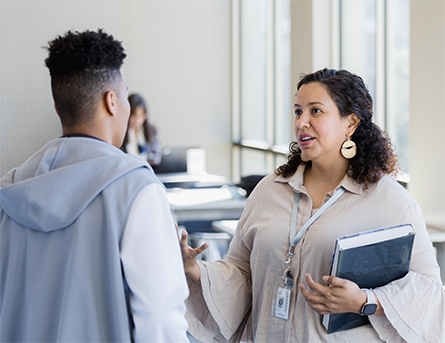Mentoring wins over training in science
On April 14, I was reminded of the powerful relationships that mentoring cultivates and how it impacts lives.
On that day, I attended the homegoing for Joshua Emmanuel Owusu–Koramoah, a 2020 College of William and Mary graduate, a chemistry major and a linebacker on the football team, who had been found murdered the week before.

The circumstances of Joshua’s death were terrible and tragic, but being at that service reminded me that great or even good mentorship integrates our lives — resulting in the pinnacle goal of belonging. Instructors often consider “their” student one who completed a course with them, was their academic advisee, or worked in their research lab. Joshua was not a student in my course, nor was I his advisor, nor was he in my research program, but he was my student because we were both William and Mary. Therefore, I did not hesitate to mentor him. In fact, it is an honor that I’m glad I accepted.
I am guilty of using the words “training” and “mentoring” interchangeably, but there is a distinct difference between the two. I credit my family and my mentors for helping me develop my mentoring style. I learned from peers, students and colleagues and through observing that programs that are limited to training provide students with fewer advantages than programs with a good mentoring component. Mentoring helps students to develop coping mechanisms to handle stress, uncertainty and unknowns that are an integral part of a scientific career. I have become an advocate for understanding the difference between training and mentoring — and will continue to work at using the two terms correctly.
Mentorship is a selfless act; it focuses on serving the best interests of the protégé. Training is oriented toward conveying competence in techniques to lead to a completed product. Yes, mentorship also encompasses this, but it transcends to more and is much more rewarding.
Mentoring provides a continuous foundation, while training is a finite duty. From my perspective, training is comparable to an assembly line: Individuals are required to do a defined task to complete their job. For example, some labs assign students to complete the PCR portion of a project. Students are provided with the samples and reagents and taught the protocol to complete the project successfully. This is training; it only requires the use of the student’s hand. Mentorship involves the student as a whole person.
Thus, how can we expect training programs alone to increase a sustainable pipeline of diversity in science, technology, education and mathematics? Belonging remains the elusive goal that will increase diversity in any discipline and, quite frankly, any positive relationship.
My Ph.D. advisor, William R. Eckberg at Howard University, and Winston A. Anderson, who received the Presidential Award for Excellence in Science, Mathematics and Engineering Mentoring, mentored me as a grad student and still do. Coming from a predominantly white university (University of North Carolina at Chapel Hill) to Howard provided me with a comfortable place to develop and grow as a scientist. There was no doubt that I belonged.
The most pivotal moment for me to excel beyond my own expectations was my postdoctoral experience under Nicholas K. Tonks at Cold Spring Harbor Laboratory. When he stated the minimal journal publishing he expected from all of us, I belonged. His expectations for me were the same as for anyone else; we might reach the goal differently, but we all were expected to achieve it, no matter our sex, gender identity or race. It is noteworthy that he paid attention to all of our different scientific and cultural backgrounds, and that helped the science to excel.
Tatiana Prioleau, a biology major and 2021 William and Mary graduate, was my undergraduate researcher and is now a protégé. She stated it best: “Anyone can train you but not everyone can be a good mentor.”

Notice the adjective is “good” and not “great.” We seek to be great mentors; however, becoming a good mentor will accomplish our goal of providing an environment of diversity and inclusion, which should catapult our protégés to belonging.
Good science mentors allow their protégés to grow and develop into independent thinkers under their supervision. They allow their protégés to make mistakes while teaching them that troubleshooting is a major part of learning, not belittling them, and encouraging them to press forward. These mentors are committed to the success of the individual student while understanding that this fruitful relationship also will enhance their own research programs.
When students are encouraged to think independently, they develop ownership of their projects. This ownership benefits any research program; it cultivates a work ethic, innovation, creativity and sustained motivation. When students know that they are listened to and heard, they begin to feel a sense of belonging. They know that they belong when their mentor’s (or principal investigator’s) actions coincide with important mentor–student conversations they have had.
Mentor and protégé do not, will not and should not always agree. However, they must have a mutual understanding that both have the same goal, which is success for each other.
A good research mentoring program consists of:
- Providing an inclusive atmosphere that allows protégés to become successful from failures, not demeaned for them.
- Meeting each protégé where they are in their research career, understanding that people have been exposed (or not) to research at different levels.
- Challenging them by setting high standards, which the mentor will help them to reach.
- Providing structure for the protégé to balance their personal and professional life.
- Providing a welcoming environment where protégés will want to belong and where they will be motivated to meet the research program goals.
A great mentor elevates the relationship by removing any doubt that the mentor believes in the success of the protégé. This connection allows a student to become confident and comfortable asking questions without worrying what the mentor thinks of them. And it allows both to be vulnerable, which in turn allows both to grow and develop; the mentor grows through accepting different perspectives expressed by their students.
Both mentoring and training programs require patience and understanding. However, I hope I’ve made the differences between the two clear. Training and mentoring should not be mistaken for each other.
A training program, once completed, will enhance a resume or CV. Once the training is concluded, the relationship may end — and so may the trainee’s enthusiasm for science. The structure of a training program often doesn’t create an environment where trainees will feel they belong and will fall in love with the inquiry of science. Sure, training checks off a box, but checking off a box doesn’t make a student want to solve the mystery or puzzle. It also doesn’t help diversify science.
Mentoring programs build mutual respect, connections and, possibly, lasting friendships between the mentor and protégé. These help facilitate an identity that includes belonging. Belonging is critical to diversifying STEM — and the minimum of good mentorship is that an individual is comfortable and accepted as a vital member of the community.
Enjoy reading ASBMB Today?
Become a member to receive the print edition four times a year and the digital edition monthly.
Learn moreFeatured jobs
from the ASBMB career center
Get the latest from ASBMB Today
Enter your email address, and we’ll send you a weekly email with recent articles, interviews and more.
Latest in Careers
Careers highlights or most popular articles

From humble beginnings to unlocking lysosomal secrets
Monther Abu–Remaileh will receive the ASBMB’s 2026 Walter A. Shaw Young Investigator Award in Lipid Research at the ASBMB Annual Meeting, March 7-10 in Washington, D.C.

Chemistry meets biology to thwart parasites
Margaret Phillips will receive the Alice and C. C. Wang Award in Molecular Parasitology at the ASBMB Annual Meeting, March 7-10 in Washington, D.C.

Decoding how bacteria flip host’s molecular switches
Kim Orth will receive the Earl and Thressa Stadtman Distinguished Scientists Award at the ASBMB Annual Meeting, March 7–10, just outside of Washington, D.C.

Defining JNKs: Targets for drug discovery
Roger Davis will receive the Bert and Natalie Vallee Award in Biomedical Science at the ASBMB Annual Meeting, March 7–10, just outside of Washington, D.C.

Upcoming opportunities
No matter where you are in your career and what future path you aspire to, everyone needs leadership skills. Join ASBMB for practical strategies for building and practicing leadership skills.

Close out ASBMB 2026 with a bang
The closing reception of the 2026 ASBMB Annual Meeting will be held at the Torpedo Factory Art Center in Alexandra, Virginia.

